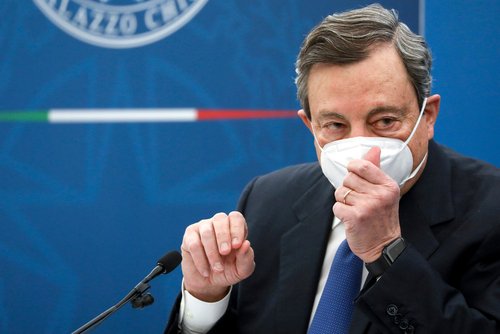Brussels (Brussels Morning) On Tuesday, Italy’s Prime Minister Mario Draghi accomplished the first major task he faced when appointed head of a wide-tent unity government, with the European Commission’s approval of his 261 billion euro plan to get Europe’s third largest economy back on course. Yet the harder part of his work lies ahead.
Draghi, a respected former governor of the European Central Bank (ECB), was brought in by Italy’s President Sergio Mattarella early this year in a bid to resolve the ongoing crisis of government resulting from continuous infighting between the major parties.
The experienced technocrat was quickly embraced by nearly all parliamentary parties, He was given almost a free rein to solve Italy’s chief problem – the country’s stagnating economy – which had worsened because of the coronavirus pandemic, which hit Italy particularly hard.
Draghi’s 261 billion euro plan relies on the 191.5 billion euro provided by the EU, which has opted to give Italy the largest share of its pandemic recovery fund, as both the hardest hit country and the country whose economy is most in need of assistance, given that the long-term health of the eurozone depends on a stable Italian economy.
The EU funds are split into direct grants worth 68.9 billion euro and subsidised loans under the Recovery and Resilience Facility, adding up to 122.6 billion euro. The remainder of Draghi’s plan will be paid for by the Italian government.
His plan hit all the right notes with the Commission and with most analysts, allotting more than a third of total funds to achieve climate objectives, with a strong focus on digital transition, growth potential, job creation and economic and social resilience. Nonetheless, Italy, notoriously resistant to systemic changes, will still face many hurdles in order to achieve its goals.
A key issue is how Italy is viewed by highly educated experts, whether Italian or foreign, a factor which makes it hard for Italy to attract and retain talent. A huge portion of the country’s youth look to find job opportunities abroad once they complete their education, which makes Italy one of the EU leaders in terms of brain drain.
Struggling to connect Italy’s academic sector to an anemic startup scene and having trouble turning ideas into technology are among the many problems identified in the Draghi plan, none of which can be solved merely by throwing money at them. A lack of broad employment options in academia and the high-tech sector is telling since top talent fears coming to Italy would hold back their career development, given the difficulty of moving between top employers every few years.
Draghi’s success will ultimately be measured in growth, something Italy sorely lacked in the past decades. While Germany’s economy grew 30.2% between 1999 and 2019, France’s by 32.4% and Spain’s 43.6%, Italy’s economy managed a mere 7.9% over the past two decades. This figure must grow, and fast, if Italy is to remain the eurozone’s third largest economy.




